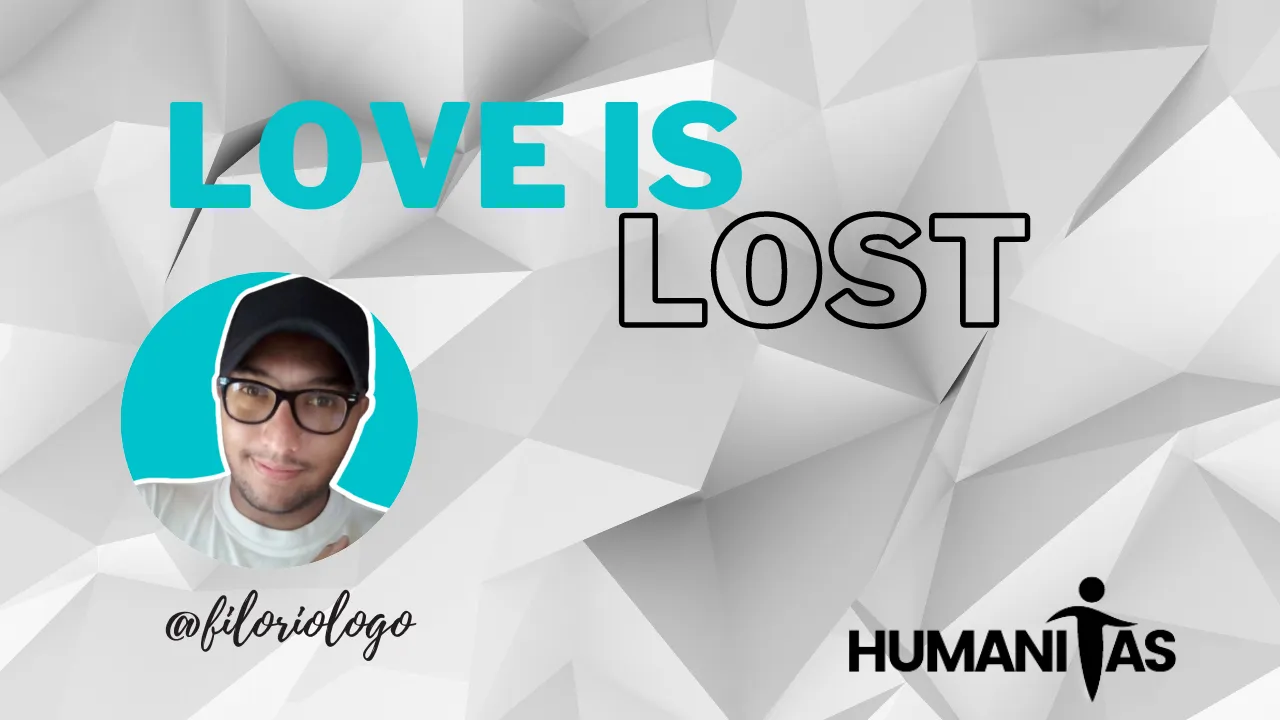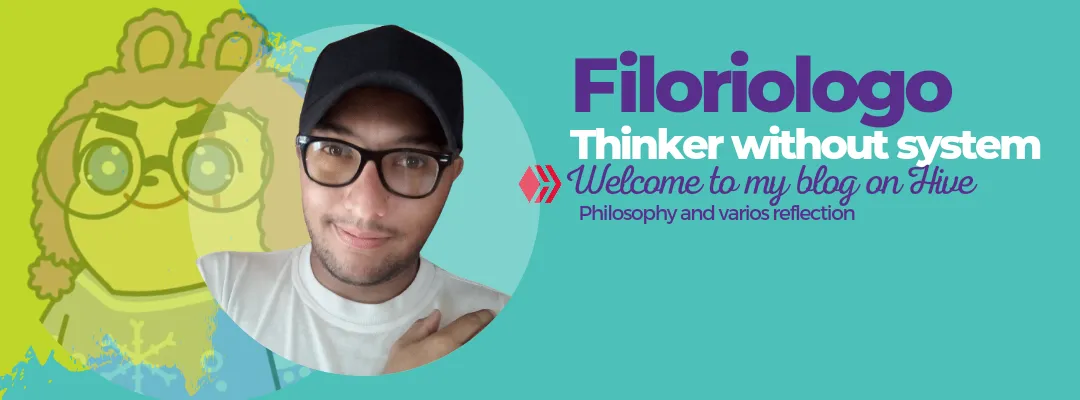
El amor es perdida
Cómo amante de la filosofía el amor es algo que siempre ha capturado mi atención, y no puedo resistir ninguna invitación a disertar sobre el amor. Por ello es que movido por la iniciativa de esta comunidad me sentí con la obligación existencial de meditar un poco en torno al amor. En vísperas al popular día de San Valentín que a mí opinión se ha mercantilizado de un modo que me causa repulsión, no podría estar más de acuerdo con la frase de Teresa de Ávila que han citado en la iniciativa:
"Le han robado el nombre al amor"
No sé mucho sobre el contexto por el cuál Teresa ha decidido vociferar tal afirmación, pero, pienso que el sentido utilitarista que le han dado al amor lo ha despojado de todo aquello que lo diferenciaba en esencia. ¿Qué es el amor? Pudiese ser la pregunta más ideal al momento de definir al amor, y es que mi definición pudiese parecer un poco antagónica, pero, deseo que usted estimado lector pueda darme la oportunidad de explicar el por qué pienso que el amor es perdida.
Aunque deseo profundamente alejar la definición del amor de una concepción utilitarista, creo que partiré de una idea un tanto utilitarista. Desde hace más de dos mil años ya las sociedades habían pensado el asunto del amor, los griegos que por lo general suelen ser mi referencia, habían pensado cuatro tipos de amor: ágape, eros, philia y storge.
Ágape, viene a ser el amor desinteresado e incondicional, mientras que philia representa al amor fraternal y comprometido, Eros representa al amor sexual, al deseo y por último, storge representa el amor duradero, pero pensar el amor como pérdida considero que puede atravesar estos conceptos, hay un punto común entre estos tipos de amor y es que el amor se muestra como la búsqueda de suplir una carencia, de llenar un vacío. Creo que la condición humana está anclada a una sensación de vacío existencial, y el amor ha sido el nombre que le damos a la voluntad de satisfacer la necesidad de llenar ese vacío. Pero antes de explicar cómo entender al amor como pérdida puede atravesar estos conceptos parciales del amor.
Nuestra existencia está delimitada por algo que no entendemos muy bien, y el no saber a ciencia cierta qué somos, las definiciones que podemos darnos son muy variadas y parciales, es casi imposible arrojar una definición que arrope a todos los humanos, la no definición de lo que somos, nos hace sentir angustia, o por lo menos eso es lo que pensaba Soren Kierkegaard y no cre que esté muy alejado de la realidad, por lo tanto el amor nace como el deseo de llenar el vacío, de completarnos frente a sentimiento de incompletitud que somos, de modo que, cuando amamos, independientemente de aquello que es amado por nosotros, nos abocamos a ello con el fin de sentirnos plenos aunque, esa aproximación implique un desgaste. Ahora bien, en este punto, volvamos por los tipos de amores griegos:
Eros, el amor como deseo erotico, romántico. Cuando amamos en este sentido, la persona amada por nosotros nos mueve a tal punto que nos importa la satisfacción de sus deseos por encima de los míos.
Philia: la amistad, es aquella relación que nos une y vincula con el otro, de una manera comprometida, de modo que la prioridad en muchos casos es el otro antes de mí.
Agape: amor incondicional y desinteresado, como por ejemplo el amor hacia una figura divina, nos sentimos dirigidos en la entrega de lo que somos y hacemos a una figura en este caso divina.
Storge: que normalmente se asocia al amor de los padres para con los hijos, y en este caso creo que es el más fácil de evidenciar el amor como perdida, porque cuando, un padre ama a un hijo, entrega todo de sí, sin importar nada más, un padre o madre da todo por un hijo sin importar nada, llegando al punto más cumbre de dar la vida si es necesario. Es una entrega total, es una pérdida total de sí por el otro, por quien se ama.
Ahora, apartamos un poco la vista a una concepción utilitarista, cuando me refiero a pérdida, no hablo de perder sin más, creo que viene a ser como una entrega desinteresada. El amor verdadero es aquel en el cual doy de mí a tal grado que el otro se convierte en mi prioridad. Creo que la Madre Teresa de Calcuta lo dijo muy bien: “Ama hasta que te duela. Y si te duele es una buena señal.” Sin duda alguna es de mis frases favoritas, y en vísperas del día de san Valentín, entiendo la pulsión social consumista, pero a mí, me parece un tanto vacío dar un obsequio a alguien que cuando dices amar, no te mueve al punto que por ejemplo, en lo cotidiano haces cosas que no te gustan o incluso te desagradan.
No hablo de llegar al punto del masoquismo, no se trata de sufrir, sino de entender que el amor es entrega plena, porque, aunque suene paradójico, dándonos nos sentimos plenos, llenar la carencia que somos se satisface con dando de sí.
¿Y tú, cómo nombras al amor? Yo lo llamo perdida…
Gracias por tu tiempo…
Invito a esta iniciativa a: @bertrayo, @audiarmisg, @rlathulerie, @mamaemigrante y @valeriavalentina

ENGLISH
Love is lost

As a lover of philosophy, love is something that has always captured my attention, and I cannot resist any invitation to discuss love. That is why, moved by the initiative of this community, I felt an existential obligation to meditate a little on love. On the eve of the popular Valentine's Day, which in my opinion has been commercialized in a way that repulses me, I could not agree more with the phrase of Teresa of Avila that has been quoted in the initiative:
"They have stolen the name of love."
I do not know much about the context in which Teresa has decided to make such a statement, but I think that the utilitarian sense that has been given to love has stripped it of everything that differentiated it in essence. What is love? It could be the most ideal question when defining love, and my definition could seem a little antagonistic, but I wish you, dear reader, could give me the opportunity to explain why I think love is lost.
Although I deeply wish to distance the definition of love from a utilitarian conception, I think I will start from a somewhat utilitarian idea. For more than two thousand years, societies had already thought about the issue of love, the Greeks, who are usually my reference, had thought about four types of love: agape, eros, philia and storge.
Agape is selfless and unconditional love, while philia represents brotherly and committed love, Eros represents sexual love, desire and finally, storge represents lasting love, but thinking of love as loss I believe that it can cross these concepts, there is a common point between these types of love and it is that love is shown as the search to make up for a lack, to fill a void. I believe that the human condition is anchored to a sense of existential emptiness, and love has been the name we give to the will to satisfy the need to fill that void. But before explaining how to understand love as loss I can go through these partial concepts of love.
Our existence is delimited by something that we do not understand very well, and not knowing for sure what we are, the definitions that we can give ourselves are very varied and partial, it is almost impossible to throw a definition that covers all humans, the non-definition of what we are, makes us feel anguish, or at least that is what Soren Kierkegaard thought and I don't think it is far from reality, therefore love is born as the desire to fill the emptiness, to complete us in front of the feeling of incompleteness that we are, so that, when we love, independently of what is loved by us, we devote ourselves to it in order to feel full although, that approach implies a wear and tear. Now, at this point, let us go back through the Greek types of love:
Eros, love as erotic, romantic desire. When we love in this sense, the person we love moves us to such an extent that we care about the satisfaction of their desires above my own.
Philia: friendship is that relationship that unites and links us with the other, in a committed way, so that the priority in many cases is the other before me.
Agape: unconditional and disinterested love, as for example the love towards a divine figure, we feel directed in the surrender of what we are and what we do to a figure in this case divine.
Storge: which is normally associated with the love of parents for their children, and in this case I think it is the easiest to demonstrate love as loss, because when a parent loves a child, he/she gives all of him/herself, no matter what, a father or mother gives everything for a child no matter what, reaching the highest point of giving his/her life if necessary. It is a total surrender, it is a total loss of self for the other, for the one who is loved.
Now, if we look away a little to a utilitarian conception, when I refer to loss, I am not talking about losing without further ado, I think it comes to a selfless surrender. True love is one in which I give of myself to such a degree that the other becomes my priority. I think Mother Teresa of Calcutta said it very well: "Love until it hurts. And if it hurts it is a good sign." Without a doubt it is one of my favorite phrases, and on the eve of Valentine's Day, I understand the social consumerist drive, but to me, it seems somewhat empty to give a gift to someone who when you say you love, does not move you to the point that for example, in everyday life you do things that you do not like or even dislike.
I am not talking about reaching the point of masochism, it is not about suffering, but about understanding that love is full surrender, because, although it sounds paradoxical, by giving ourselves we feel full, filling the lack that we are is satisfied by giving of ourselves.
And you, what do you call love? I call it lost...
Thank you for your time...

Otras|Other RRSS

